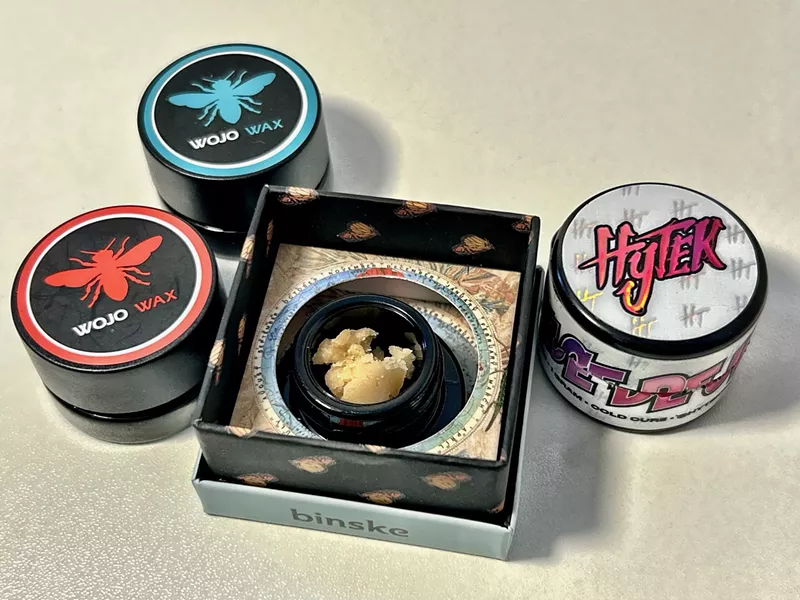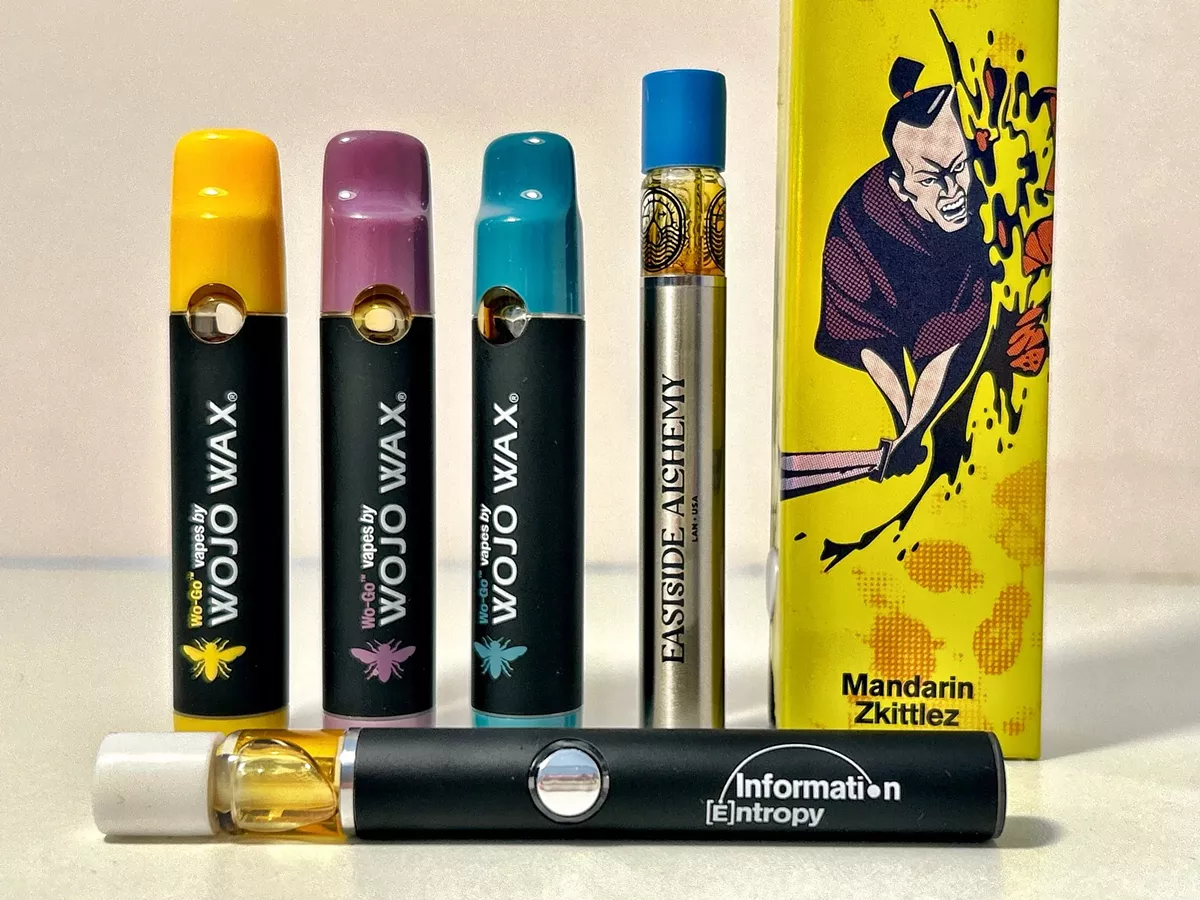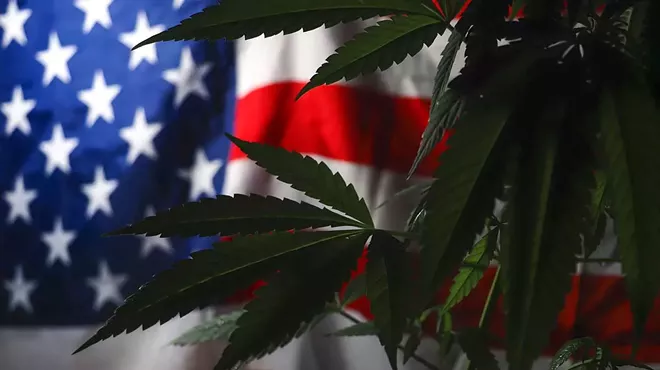Welcome to The Straight Dope, our weekly series that explores the best cannabis products in Michigan.
Disposable cannabis vapes are convenient, inexpensive, and easy to use.
Dozens of cultivators in Michigan are churning out throwaway, all-in-one vaporizers, and dispensaries are selling them for as low as $10 apiece. Many of them come in flashy packaging and are preloaded with a half gram to a full gram of potent, flavorful concentrates like live rosin.
But the convenience and low prices come with a heavy environmental toll. The single-use devices are mass-produced overseas with cheap, toxic parts, shipped halfway around the world, used for a few days, and then tossed in a landfill, despite federal regulations that classify them as hazardous waste.
The consumer saves a few bucks. The planet pays for it.
In February 2025 alone, Michigan’s recreational cannabis market sold more than $45 million in vape products, or roughly 10,900 pounds of cannabis oil.
Part of the appeal is the rise of live rosin, a clean, flavorful concentrate made without solvents. It’s now one of the most popular ways to consume cannabis, and many producers have responded by packaging it in sleek, precharged vapes that require no setup, charge, or maintenance.
On the other hand, reusable pens and dabbing rigs, can be expensive, messy, and intimidating, especially for newcomers. Disposables work right out of the package.
Some cultivators are pushing the vapes to their extreme. North Coast Cultivators, based in the Upper Peninsula, recently launched a $10 “fun-sized” disposable filled with just 0.15 grams of live rosin. They advertise 30 puffs, but customers on Reddit say that’s generous.
“They fucking suck lol. I tried one. Literally had like 5 hits in it,” one user wrote.
Another called it “the most wasteful product in the state’s legal system.”
They’re not wrong. Disposable vapes typically last a day to a week. After that, consumers discard the entire unit, which includes a lithium battery, electronics, plastic, and other hazards.
Lithium batteries pose environmental risks at both ends of their life cycle. Mining lithium requires large amounts of water and often leads to soil degradation, water shortages, and contamination in surrounding communities, especially in countries with lax environmental protections. Once discarded, the batteries can leach toxic chemicals into landfills or spark fires in waste facilities, making improper disposal both dangerous and environmentally damaging.
In addition, the plastic components contribute to microplastic pollution and will persist in the environment for extended periods.
I don’t entirely blame the cultivators. The industry is struggling with plummeting prices, and even the best live rosin producers — from Wojo and Eastside Alchemy to 710 Labs and Information Entropy — are selling disposable vapes. They’re responding to a demand for instant gratification.
Still, it’s rare to find packaging that warns against throwing disposable vapes in the garbage. In fact, I haven’t come across one yet.
Michigan regulators have done little to address the growing waste. There’s no statewide take-back program, and most dispensaries won’t accept them after they’re used. The state also does not require companies to advise consumers not to throw the vapes away.
So most people toss theirs in the trash, never to think of the waste they’re creating.
Before the corporate money flooded into the legal market, cannabis was community-driven and embraced sustainability. Growers cared about the environment. Packaging was minimal. Waste was limited.
Now they’re selling single-use electronics filled with cannabis oil, and consumers are tossing them like candy wrappers.

Most of these devices are manufactured in factories overseas, often in China, using low-cost plastics and embedded lithium-ion batteries. They’re cheap to make and easy to sell, but they’re very difficult to safely discard or recycle.
By federal law, cannabis vapes cannot be discarded in the trash or placed in standard recycling bins. The marijuana residue makes them “hazardous waste,” and they cannot be shipped across state lines to be recycled or properly discarded because marijuana is still illegal on the federal level.
Removing the batteries is difficult and time-consuming. Recycling them requires strict handling protocols and specialized hazardous waste facilities, and there aren’t many that take disposable vapes.
Michigan’s Department of Environment, Great Lakes, and Energy (EGLE) may soon take action. EGLE spokesman Jeff Johnston says the agency is working with the cannabis industry and the U.S. Environmental Protection Agency (EPA) on a solution.
“EGLE is aware of the disposal and recycling challenges associated with these devices and is working with the cannabis industry on a resolution,” Johnston tells me. “We are also working with the U.S. EPA on solutions and expect EPA recommendations in the very near future, at which point we expect to be able to offer guidance and encourage recycling of these devices.”
For now, Michigan’s official advice is to bring disposables to a household hazardous waste collection site or to a retailer that participates in a recycling program. If that’s not available, consumers are told to check with their local police during the next Drug Enforcement Administration’s Drug Take Back Day.
Before I became aware of the environmental hazards, I bought a couple dozen throw-away vapes in the past year. They’re now in a drawer until I find a place to safely discard them. I have yet to find a single waste collection site that would take them.
Imagine trying to find one in a rural area, where collection options are even rarer.
Michigan’s Cannabis Regulatory Agency (CRA), which oversees the legal market, has not yet issued any guidance or restrictions on disposable vapes. But that could change if residents demand more environmental protections. The CRA is currently revising its rules and scheduled a public hearing on May 6. Spokesman David Hars says now is a good time for anyone to make recommendations.
California is already leading the way. A new law that took effect in July requires all cannabis vapes to be labeled as hazardous waste and bars companies from marketing them as disposable. Another bill, introduced earlier this year, would ban single-use vapes altogether, including nicotine and cannabis devices.
In Monroe County, New York, local officials created a vape collection program for nicotine products to address the growing e-waste problem.
In Michigan, Jane Fitkin is one of the few trying to do something. She’s the director for Upper Peninsula-based Citizens for a Safe & Clean Lake Superior. Her group launched a pilot program to collect nicotine vapes, and so far, they’ve kept nearly 1,000 out of the landfill.
“The vape recycling program honestly started as my personal soapbox,” Fitkin tells me. “I live in a beautiful town on the shores of Lake Superior, and I see disposable vapes littered like cigarettes. The consequences to our water resources terrify and infuriate me.”
Cannabis vapes are harder to collect because of federal laws, Fitkin says. Still, she believes there’s a path forward and hopes state lawmakers or regulators act soon. For one, she says, the state legislature could pass Extended Producer Responsibility (EPR) legislation for the lithium batteries, which shifts the burden of disposal from consumers and local governments to the companies that make the products. In the case of lithium batteries, that means manufacturers would be required to fund and operate programs to safely collect and recycle used batteries, including those embedded in disposable vape pens and other electronics.
Only a handful of states have adopted EPR laws for batteries so far, and most focus on rechargeable ones. California became the first state in 2022 to pass an EPR law covering both single-use and rechargeable batteries. Other states, including Washington and Vermont, have passed more limited regulations.
“This would put responsibility on manufacturers for the cradle-to-grave consequences of these products, essentially requiring them to set up a program to properly dispose of them,” Fitkin says.
Matt Naimi, co-founder of Recycle Here!, a Detroit-based recycling center, agrees. People frequently ask him if they can recycle their disposable vapes at Recycle Here!, and he points out that he can’t. The onus should be on the producer, Naimi says.
“The people who produce this stuff, it is their responsibility,” Naimi says. “They’re producing the garbage. E-waste is a big problem but no one ever thinks about it.”
Before the corporate money flooded into the legal market, cannabis was community-driven and embraced sustainability. Growers cared about the environment.
tweet this
Fitkin and Naimi also suggest legislation modeled after Michigan’s 10-cent carbonated beverage deposit law. An extra fee — say, $1 — could be added to the sale of each disposable vape to encourage consumers to return them to the store.
“We have this great system with our beverage containers,” Naimi says. “There is a system we put in place for our bottles and cans that adds an artificial value, which is the deposit. It was really, really successful.”
Fitkin says the ultimate goal is to recycle lithium batteries.
“We’re seeing increased demand for lithium as a resource, and increased unethical mining practices for it as a result,” she explains. “At the national scale, we throw away something like 150 million vapes every year, which equates to enough lithium to power about 6,000 EVs [electric vehicles]. We see the harm hard rock mining has caused in our U.P. communities and watersheds, and want to mitigate that impact — robust metals recycling is probably the most effective way to decrease mining pressure.”
Until state lawmakers or regulators act, cannabis consumers have other alternatives for vaping concentrates. While dab rigs and reusable pens might not be as convenient, they are less expensive and consistent and far better for the environment, and most offer a more flavorful experience than disposable vapes. Once you get the hang of it, you’ll see the perks.
Many dispensaries carry reusable vapes and dab rigs. Nature’s Remedy in Ferndale has the best selection I’ve seen in metro Detroit. Puffco is a popular company for reusable vaporizers.
In the rush for convenience, the cannabis industry has created a product that is cheap, profitable, and wildly unsustainable. What’s missing is accountability, from regulators and lawmakers to the companies making millions off of single-use electronics they know are destined for the landfill.
Fixing that won’t be simple. It will take new laws, better recycling infrastructure, and producers willing to take responsibility for the waste they’re generating.
If Michigan’s cannabis industry wants to call itself “green,” it’s time to start acting like it.
“You almost have to give people the harsh realities,” Naimi says. “We aren’t doing a very good job with the planet.”
If you want us to sample your cannabis products, send us an email at [email protected].





